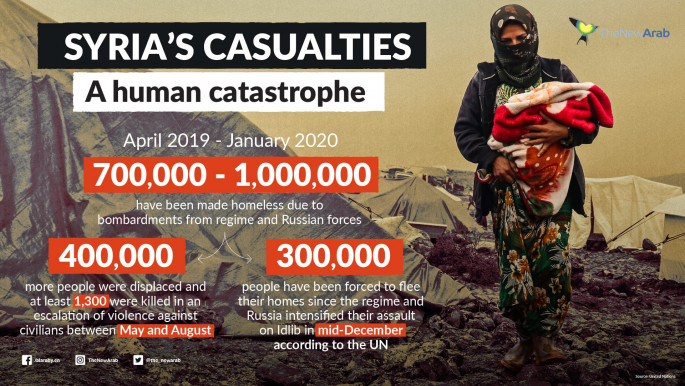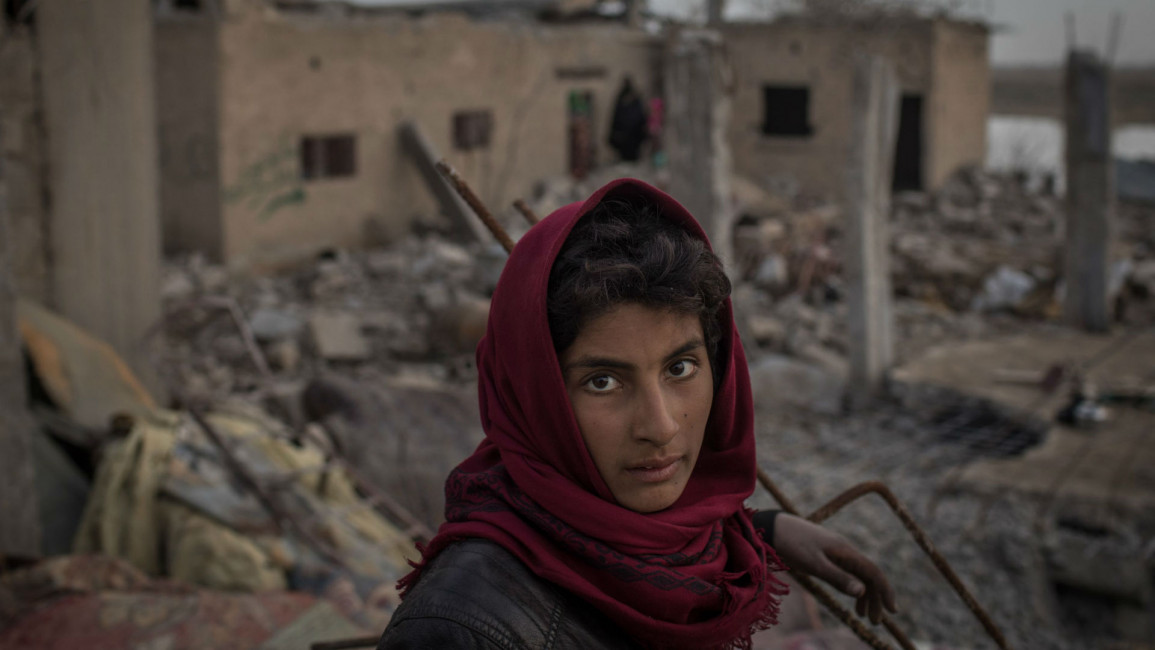More Libyans are dying than ever due to 'UAE, Turkey military intervention'
More Libyans are dying than ever due to 'UAE, Turkey military intervention'
A new report has found that thousands of people have died in 2019 across Syria, Iraq and Libya due to interference from foreign powers.
3 min read
Over 700,000 civilians in Syria are internally placed [Getty]
Civilian deaths in Syria resulting from international military actions have decreased, but in Libya they have increased sevenfold, a new report has found.
Research by Airwars found that at least 2,214 civilians were locally allegedly killed by foreign actions across Syria, Iraq, Libya and Somalia during 2019. This is a 42 percent decrease from the previous year.
However it is not a cause for celebration. From April, the Libyan National Army, lead by general Khalifa Haftar launched a series of violent offensives in an effort to capture Tripoli, the base of the UN-backed government.
As a result of this increase in activity Haftar’s side found itself supported by a bloc of authoritarian states: the UAE, Egypt, Jordan and Saudi Arabia.
Turkey backs government forces led led by Fayez Al-Sarraj.
Read More: Refugees and riot police clash as tensions reach boiling point on Greek Islands
This spike in foreign interference has led to a shocking 780 percent increase in alleged deaths in comparison to 2018.
And between April and December last year, over 279 – and as much as 399 - civilians died as Haftar's forces push against a UN-backed government, with heavy involvement by the UAE and Turkey.
Russian strikes bolstering the Bashar Al-Assad regime claimed at least 1,000 lives in Idlib and Hama offensives, and Turkey’s invasion of northern Syria in October saw over 300 non-combatants allegedly killed.
Russia, Turkey and mass displacement
Foreign intervention in Syria, and increasingly Libya has led to another devastating impact on the region: mass displacement.
Researchers tracked at least 1,000 civilian deaths in 710 casualty incidents carried out by Russia - 81 percent of these happened in Idlib, where Russia has been heavily propping up the regime.
Russia's ongoing campaign in Syria has also devastated civilian populations and infrastructure, and as a result 700,000 have become internally displaced.
American President Donald Trump pulled troops out of Syria in October and this paved the way for Turkey to launch Operation Peace Spring and invade, resulting in between 246 and 314 civilians dying in the final three months of 2019.
Some 700,000 Syrians have fled Idlib following a brutal and prolonged regime offensive, the UN said on Tuesday.
"In just ten weeks, since 1 December, some 690,000 people have been displaced from their homes in Idlib and surrounding areas," a spokesman for the Office for the Coordination of Humanitarian Affairs said.
"This is, from our initial analysis, the largest number of people displaced in a single period since the Syrian crisis began almost nine years ago," David Swanson said.
The UN expressed concern for civilians as Idlib is hit by freezing temperatures amid shortages of tents, food, and clean water.
In Libya, an increasing number of civilians have been displaced due to heavy shelling.
More than 140,000 Libyans have fled their homes since April last year, when forces loyal to eastern-based General Khalifa Haftar launched an assault on Tripoli, seat of the UN-recognised government.
Research by Airwars found that at least 2,214 civilians were locally allegedly killed by foreign actions across Syria, Iraq, Libya and Somalia during 2019. This is a 42 percent decrease from the previous year.
However it is not a cause for celebration. From April, the Libyan National Army, lead by general Khalifa Haftar launched a series of violent offensives in an effort to capture Tripoli, the base of the UN-backed government.
As a result of this increase in activity Haftar’s side found itself supported by a bloc of authoritarian states: the UAE, Egypt, Jordan and Saudi Arabia.
Turkey backs government forces led led by Fayez Al-Sarraj.
Read More: Refugees and riot police clash as tensions reach boiling point on Greek Islands
This spike in foreign interference has led to a shocking 780 percent increase in alleged deaths in comparison to 2018.
And between April and December last year, over 279 – and as much as 399 - civilians died as Haftar's forces push against a UN-backed government, with heavy involvement by the UAE and Turkey.
 |
Russian strikes bolstering the Bashar Al-Assad regime claimed at least 1,000 lives in Idlib and Hama offensives, and Turkey’s invasion of northern Syria in October saw over 300 non-combatants allegedly killed.
Russia, Turkey and mass displacement
Foreign intervention in Syria, and increasingly Libya has led to another devastating impact on the region: mass displacement.
Researchers tracked at least 1,000 civilian deaths in 710 casualty incidents carried out by Russia - 81 percent of these happened in Idlib, where Russia has been heavily propping up the regime.
Russia's ongoing campaign in Syria has also devastated civilian populations and infrastructure, and as a result 700,000 have become internally displaced.
American President Donald Trump pulled troops out of Syria in October and this paved the way for Turkey to launch Operation Peace Spring and invade, resulting in between 246 and 314 civilians dying in the final three months of 2019.
Some 700,000 Syrians have fled Idlib following a brutal and prolonged regime offensive, the UN said on Tuesday.
|
"In just ten weeks, since 1 December, some 690,000 people have been displaced from their homes in Idlib and surrounding areas," a spokesman for the Office for the Coordination of Humanitarian Affairs said.
"This is, from our initial analysis, the largest number of people displaced in a single period since the Syrian crisis began almost nine years ago," David Swanson said.
The UN expressed concern for civilians as Idlib is hit by freezing temperatures amid shortages of tents, food, and clean water.
In Libya, an increasing number of civilians have been displaced due to heavy shelling.
More than 140,000 Libyans have fled their homes since April last year, when forces loyal to eastern-based General Khalifa Haftar launched an assault on Tripoli, seat of the UN-recognised government.

![Trump's warm greeting to Netanyahu contrasted with Kamala Harris's critical reception [Getty]](/sites/default/files/styles/image_330x185/public/2024-07/GettyImages-2162908988.jpg?h=69f2b9d0&itok=OLc5dL88)
![The brutal assault on Khan Younis has killed dozens and displaced thousands more [Getty]](/sites/default/files/styles/image_330x185/public/2024-07/GettyImages-2162526709.jpg?h=d3eda8cf&itok=n5N-o8p5)
![Members of the Algerian delegation threw roses into the Seine [Getty]](/sites/default/files/styles/image_330x185/public/2024-07/GettyImages-2162980872.jpg?h=199d8c1f&itok=h_3o_TOL)